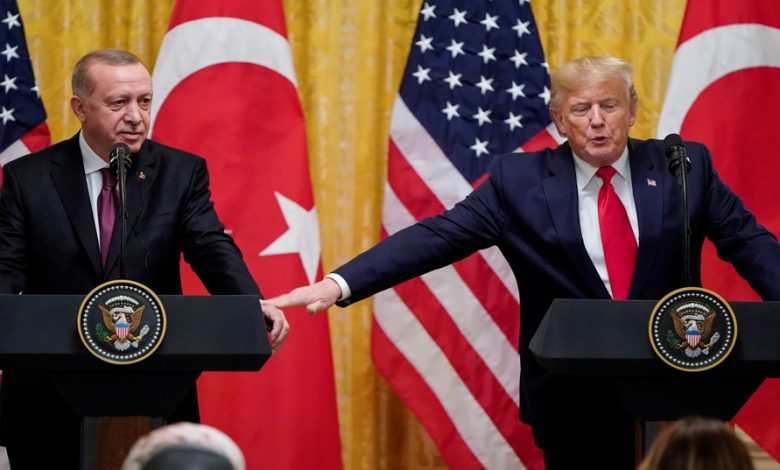Erdogan, Trump agree on ‘some issues’ regarding Libya
Turkish President Recep Tayyip Erdogan says he and US President Donald Trump have come to unspecified agreements about the conflict in Libya, where a host of countries are aiding rebels against a Turkish-backed government.

“A new era between Turkey and the US may start after our phone call. We agreed on some issues,” Erdogan said in an interview with state broadcaster TRT on Monday, without elaborating.
Ankara backs the internationally-recognized government of Libyan Prime Minister Fayez al-Serraj against rebels commanded by military strongman Khalifa Haftar. The United Arab Emirates and Egypt, among other countries, back Haftar.
The White House also confirmed in a statement that Trump and Erdogan had discussed the conflict in Libya, as well as Syria and the wider eastern Mediterranean region, but similarly provided no details.
Haftar’s rebels launched a deadly offensive to capture Tripoli, the seat of the Libyan government, in April last year. They have not been able to advance past the city’s outskirts. Recently, government forces have made major gains against the rebels, retaking a major airport and liberating several towns.
Egypt recently proposed a ceasefire that would have started on Monday as the Libyan rebels lost ground. While Russia and the UAE welcomed that initiative, the Libyan government and Turkey — whose support for Tripoli has helped change the course of the war — said fighting would continue to recapture the coastal city of Sirte and the Jufra air base, to the south, in a strategic region of the oil-exporting country.
“Now the goal is to take over the whole Sirte area and get it done. These are areas with the oil wells, these are of great importance,” Erdogan said.
Libya’s Interior Minister Fathi Bashagha also stressed that the government would engage in political talks only after retaking Sirte and also the inland Jufra airbase.
Erdogan also announced that he would discuss Libyan matters with Russian President Vladimir Putin, including what he said was the supply of Russian planes and Pantsir air defense systems to Haftar’s rebels.
“They have Pantsirs there, they sent 19 warplanes to Libya,” Erdogan said, adding, “After talking with him (Putin), we can plan ahead.”
Russia has denied dispatching warplanes to Libya.
Russia, Turkey support Libya peace process
Meanwhile, Russia’s Foreign Ministry said in a statement that Russian Foreign Minister Sergei Lavrov and his Turkish counterpart, Mevlut Cavusoglu, had agreed on the need to collaborate toward a peace process in Libya in a call on Monday.
The two sides also agreed that a new UN Libya envoy must be appointed swiftly, according to the statement.
EU rejects Cairo process, Germany urges UN-backed talks
Separately, the European Union (EU) has rejected a peace process unilaterally proposed for Libya by Egypt, insisting that a European initiative known as the Berlin Process be pursued.
“In general, any initiative in line with the United Nations-led Berlin Process is a positive development. But no alternative to the inclusive political solution of the Berlin Process, also confirmed by the UN, is acceptable,” the EU’s chief spokesperson on foreign policy, Peter Stano, said Monday.
Berlin hosted a conference aimed at finding a political solution to the Libyan crisis last January that was attended by world powers and regional actors.
Also in a phone call with Egyptian President Abdel Fattah el-Sisi on Monday, German Chancellor Angela Merkel reiterated the necessity for UN-backed talks to go forward, according to the German government.
Libyan army advance in Sirte, UAE drones target hospital
Libyan government forces on Monday pushed further into the strategic city of Sirte — the key gateway to the country’s main oil fields in the east — in the latest battlefield gains against Haftar’s rebels.
Meanwhile, Emirati drones supporting Haftar hit a field hospital in the village of Abugrein, 115 kilometers south of Misrata, in northwestern Libya, the Libyan army said.
The government-led Operation Volcano of Rage said in a statement on Facebook that the attack only caused material damage to the field and the ambulances in Abugrein.
Libya plunged into chaos in 2011, when a popular uprising and a NATO intervention led to the ouster of long-time dictator Muammar Gaddafi.







